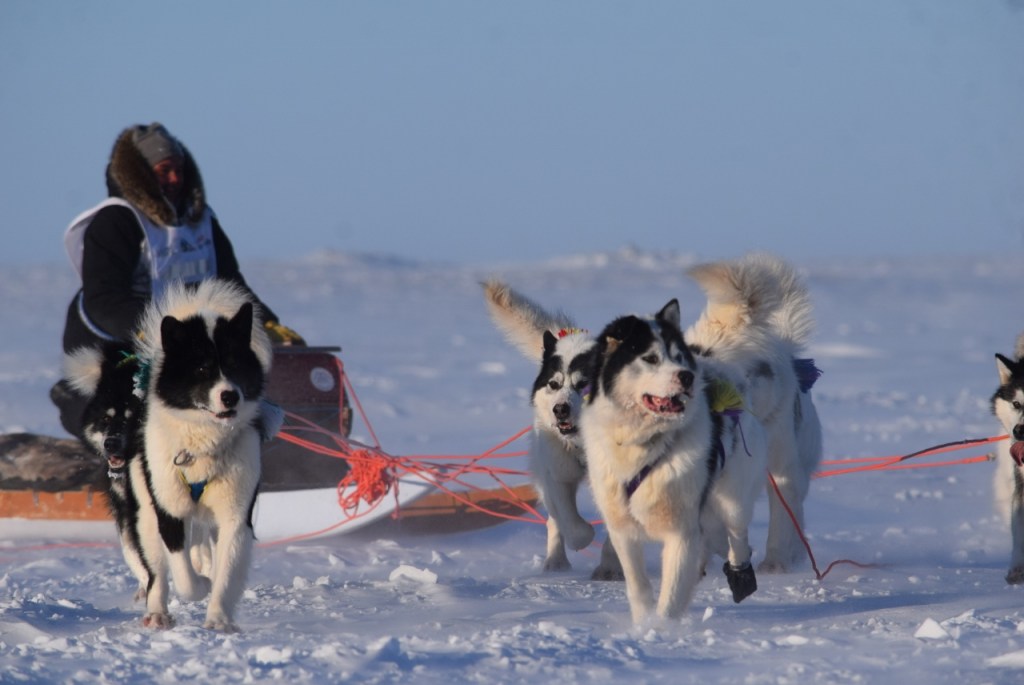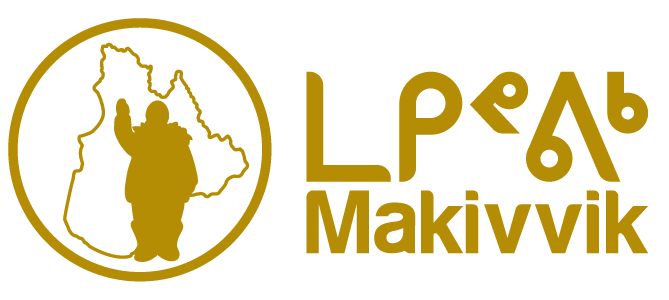Junior May has always had dogs. “I just loved dogs since I was a kid. All my life I’ve been having dogs and I just really like it,” he said with a chuckle from his home in Kuujjuaq. Yet, it’s still impressive that he has the distinction of being the only individual who has run dogs in both the first Ivakkak race, 21 years ago, and in this year’s 20th edition of event, which finished in mid-March.
“I won it before,” Junior said. “I won it once in 2002, so I know how it feels.”
This year’s race was won by Team 2, Aisa Surusilak and partner Paulusi Amarualik, with the shortest overall time of 39 hours, 30 minutes and 3 seconds. Second place went to Team 11, Jani-Marik Beaulne and partner Jackusie Amamatuak, with a total time of 42 hours, 3 minutes and 25 seconds. Third place went to Team 10, Kulu Tukalak and partner Peter Qinuajuak with a total time of 43 hours, 32 minutes and 12 seconds.
By all accounts this year’s race was a grueling one. Weather and snow conditions wreaked havoc on mushers and on their dogs’ paws. Junior admitted that this year was one of the toughest race years he has endured, and he’s raced in 16 or 17 since the Ivakkak was launched in Umiujaq in 2001. This year, Junior shared the experience with his partner and son, Aqujak Snowball May. The event began in Salluit on February 24 with 12 teams. Junior described the beginning of the race.

Junior ran dogs both in the inaugural Ivakkak race back in 2001 and in this year’s event. Photo by Caroline Oweetaluktuk
“Right from the start the day was overcast and not that nice in the morning. Once we started going up to the plateau between Salluit and Ivujivik, the weather was getting nicer, but we were starting to get into soft snow conditions which was pretty tough. That first day was quite a few hours of a steady incline up to the plateau.”
It was hard on all the teams, especially Junior’s, as he was running a young team and the dogs’ feet took a beating. In fact, all of the first four race days were rough, he explained. The day after, on their way into Ivujivik, the forecast called for high winds and a blizzard overnight. In light of that, the Ivakkak support crew decided to put the checkpoint 20 km from the community, and the teams chose how to get their dogs from there to Ivujivik. The forecast was correct, and harsh, windy, conditions kept the mushers holed up in Ivujivik for three days.
Once the storm conditions lifted, the race resumed, but conditions were still harsh.
“The weather was nice, but the snow was really soft. There was a thin layer of ice, apparently there was freezing rain about a month before, so the dogs were getting really cut up on their paws. We have booties for them but not enough for all dogs,” Junior said. Travelling into Kuuvik was again very hard, and Junior made the decision to retire one of his older dogs there and had him travel with the support crew on their sled.
“I didn’t want to push him too hard. He was an older dog and I felt sorry for him.”

At this point three other teams had left the race altogether. Team 3, Matthew Arngak and partner Padlayat Kaitak, were the first out when their dogs decided they no longer wanted to pull. Team 8, Alec Aupaluk and partner Tiivi Kulula, also decided to end their Ivakkak run early. Team 5, Paulusie Jason Irnik and partner Jamie Kiatainaq, were removed from the race for safety reasons after their dogs faced difficulties travelling in the tough snow conditions and the team had to be collected by the support crew.
Third place finisher Kulu Tukalak, who was also awarded Rookie of the Year, and Most Traditionally Dressed, explained that eventually, the weather began to cooperate.
“About halfway through, the snow conditions were much more solid where all the dogs are familiar to,” he said. “It became easier. But at that point most of the dogs’ paws were injured and cut due to the past trails, so it’s not like they were at their 100 per cent.”
On March 10, after eight racing days and travelling about 450 km through the communities of Ivujivik and Akulivik, nine teams made it to the finish line in Puvirnituq. Notably, the top three finishing teams were all from that community. Kulu said that the two veteran teams that came in first and second place, while both slightly younger than him, are considered by him to be his teachers.
“I go camping with them from time to time and they give me pointers here and there, so they’ve been great mentors to me,” he said.

For Junior, seeing rookies like Kulu and younger teams enter the race is encouraging. Dogs, he said, are one of the most important parts of Inuit culture.
“We always hear stories of how dogs saved people and any person I’ve ever talked to who used to run dogs before their snowmobiles, say they couldn’t live without the dogs,” he said. While he’s not sure if he will race again next year, Junior joked that he will likely have dogs until he’s 80 years old. Even if he’s not participating in Ivakkak.
“Dogs are really one of the most important reasons why our generation, us, are here. We have to pay homage to that,” he said. “I’ve always understood that.”
Ivakkak 2021 was marshalled by Paulusie Beaulne. The Trail Coordinator was Juani Beaulne, and officials were Billy Palliser and Jackusie Ittukallak. Vet services were provided by Nadeigne Giguere and assistant Matthew Alaku. The Makvik Race Coordinators were Akinisie Sivuarapik and Lynn Moorhouse.
For more information on the teams, sponsors, and results of Ivakkak 2021, please visit their website at www.ivakkak.com.






